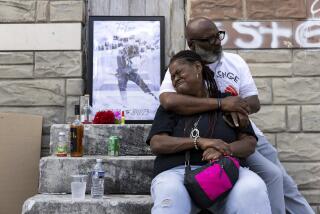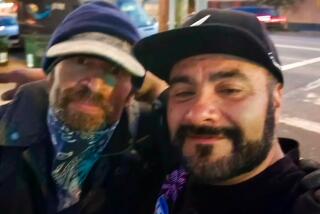Father is feeling failure
- Share via
The circumstances of his life and death have given Jamiel Shaw Jr. a special niche in the city’s pantheon of tragedy.
He was the high school football star shot to death last month, just a few steps from his home on an Arlington Heights street unaccustomed to violence.
His soldier mother was off in Iraq. She refused, on the long trip home, to believe her son was gone. His father had raised their sons by the book, doing everything he knew to keep Jamiel and his younger brother, Thomas, safe.
The alleged 18th Street gang member accused of killing Jamiel had just gotten out of jail. He was living here illegally and had not been deported.
The story of Jamiel’s March 2 murder made its way around the world, drawing cards and letters from China, Germany, Norway, Japan. Bill Cosby called his parents. President Bush sent a sympathy letter. The funeral was covered by CNN.
There was no way to watch Jamiel Shaw kneeling at his son’s open casket and not be moved. I couldn’t stop thinking about the image. So I called the Shaw family and asked to visit.
I found a weary, bewildered man, stunned by his loss.
He kept repeating: “We had an 18-year-old plan.” Study hard, play hard, keep your nose clean. Life will be good, he promised his son.
“College wasn’t an option. He was going to college,” said Shaw, a high school dropout who passed a general education development test. “My job was to get him through high school, get him ready. He did everything I asked him to.”
His son was a high school junior when he died, one year from the end of their 18-year deal.
Now Shaw is forced to ask himself: What do you do when your mission fails?
The living room of the Shaw family’s home -- with its formal furniture and polished wood floors -- is a shrine to the boy they called Jas. Flowers, photos, trophies and cards cover the tables, shelves and walls.
Shaw slumped wearily in his chair. I asked how he’s doing and he talked for two hours. His eyes were red and rarely met mine.
He was dressed as I imagined Jas would have been -- in baggy, creased jeans and a colorful sweat shirt, embroidered with sports logos. Together they had played video games, spun music at family events, rode their low-rider bikes at the beach.
Shaw had been Mr. Mom for eight years. His wife, Anita, joined the Army when Jas was 5. She took the boy with her to Ft. Hood, Texas, but after second grade he moved back to live with his dad.
“I started doing research about being a father,” Shaw said, “and I found this study that said if you keep them busy with sports until they’re 14, chances are, they’ll stay out of trouble.”
So he signed Jas up for football, baseball and basketball, and coached every team his kid played on. “In eight years, I never missed a game,” he said.
His sons went to church with him on Sunday. And they spent summers traveling up and down the state, enrolling Jas in whatever sports camps his father could afford.
“I always told him don’t worry about the money,” Shaw said. “I’ve got a job. Your job is to get an education . . . a wife, a home, some kids. Then you’ll have worries.” He laughed, then wiped his eyes.
Two days before the shooting, his father signed Jamiel up for a $450 SAT prep class. Stanford and Rutgers had come calling; he wanted his son to meet their standards.
Jas was closing in on 18 and Dad was taking no chances. He wouldn’t let his son get a driver’s license. The night before Jas died, he kept him home from a party.
“I told him, ‘There’s too much shooting going on.’ He was mad that I wouldn’t let him go. He spent the night in his room playing video games. He kept telling me, ‘Dad, it’s not like that. Everybody’s not going around with guns.’ ”
Now, Shaw feels angry, foolish and confused.
“That part doesn’t make sense,” he said. “We had an 18-year plan. We worked for it, it was happening. Hitting the books, sports on schedule. . . . I made him do all that. For what?”
He bent over and bowed his head in his hands. “Lord, I just don’t understand.”
Most parents have some sort of 18-year plan. You chart your kids’ path, from preschool to college, sweating every late night, bad grade, inappropriate wardrobe choice. My youngest daughter is the same age as Jamiel. I worry that she’ll fail math, get in a car accident, trust the guy at the party who offers her drugs.
I’m counting the days until she graduates. I’ll exhale when I have her safely off to college. But I’ve never felt I had to worry about bullets. No parent in this city should have to.
This morning, the Shaw family will appear before the Los Angeles City Council, asking that the city deport gang members who are illegal immigrants. “If they’d done that,” Shaw said, “my son wouldn’t be dead.”
On Wednesday, the Shaws will be in court, facing the man accused of killing their son. Community groups have organized to attend and support them.
At the first court hearing two weeks ago, the suspect’s friends were smirking and laughing so loud that a hurt and angry Shaw slipped out a courthouse back door “so I wouldn’t say anything I’d regret to the cameras.”
His wife goes back to Iraq on Friday. And Shaw will begin using some of those hours he used to spend watching games and waiting outside practices on a foundation he’s launching in Jamiel’s honor. DreamChasers, he wants to call it.
“It’s for kids like mine,” he said, “kids trying to do right. Whatever they need -- sports camps, tutoring, lunch money, college programs -- we want to be able to help them afford it.”
And he’ll turn his attention to 9-year-old Thomas, who idolized his big brother. Thomas may not know it now, but there’s an 18-year plan with his name on it.
--
More to Read
Sign up for Essential California
The most important California stories and recommendations in your inbox every morning.
You may occasionally receive promotional content from the Los Angeles Times.










